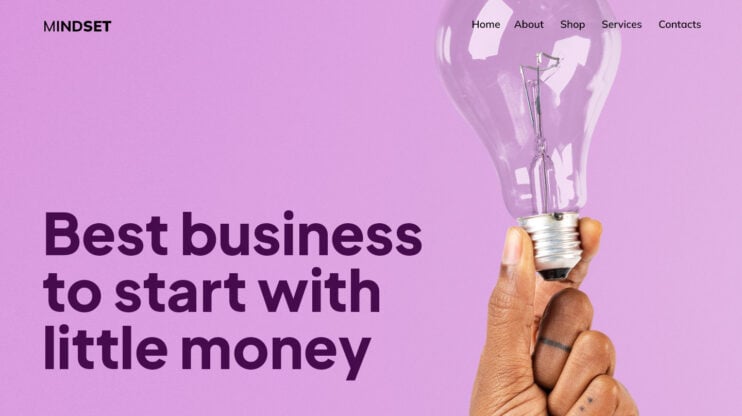To start a new business, you will need some capital Many new entrepreneurs wonder how to get the funds they need to turn their ideas into reality. There are several ways to get money to start a business, including loans, grants, and personal savings.
Finding the right funding option for your startup is key to launching a business. Each method has its pros and cons, so it’s important to research and pick the one that fits your needs best.
This article will cover proven ways to get money for your business, helping you determine which option best suits your needs. The right funding promises the long-term success of your business. Let’s discuss 10 methods to get money to start a business.
FAQ
How can I start a business if I have no money?
How do people get the money to start a business?
Can I borrow money to start a business?
How to get money for a startup?
10 methods to get money to start a business
Crowdfunding platforms
Crowdfunding can help you raise money for your business idea by allowing you to pitch your project to a large number of people online. This method not only provides the necessary funds but also validates your concept and builds a community of early supporters.
There are some types of crowdfunding, each for a different need. Here they are:
- Reward-based crowdfunding is one of the most common forms, where backers contribute funds in exchange for rewards such as early access to products, exclusive merchandise, or special experiences. This approach is ideal for creative projects, product launches, and startups looking to pre-sell their offerings.
- Equity-based crowdfunding allows investors to receive shares or equity in your company in return for their investment, making it suitable for startups seeking significant capital and willing to offer ownership stakes.
- Donation-based crowdfunding involves contributors donating money without expecting any financial return or rewards, which is perfect for social causes, charitable projects, and community-driven initiatives.
- Debt-based crowdfunding, also known as peer-to-peer lending, enables businesses to receive funds that must be repaid with interest, providing an alternative to traditional bank financing. Each of these crowdfunding methods offers unique advantages, allowing you to choose the best fit based on your business model and funding requirements.
Let’s look at the most well-known crowdfunding names out there along with their pros, cons, and requirements.
- Kickstarter is popular for creative projects. You set a funding goal and offer rewards to backers. If you don’t reach your goal, you don’t get any money.
- Indiegogo works for many types of campaigns. You can choose to keep funds even if you don’t hit your target. This flexibility can be helpful for some projects.
- GoFundMe is known for personal causes but also works for businesses. You keep all donations, minus fees. It’s good for small goals or ongoing fundraising.
- Wefunder focuses on equity crowdfunding. Investors get a stake in your company. This suits startups looking for larger amounts of capital.
| Platform | Pros | Cons | Funding Max | Eligibility |
| Kickstarter | Large audience | All-or-nothing funding | No limit | Creative projects |
| Indiegogo | Flexible funding | Higher fees | No limit | Various projects |
| GoFundMe | Keep all funds | Less business-focused | No limit | Any cause |
| Wefunder | Equity options | Complex regulations | $5 million/year | US businesses |
Pick a platform that fits your project type and funding needs. Read the rules and fees carefully before you start.
Angel investors
Angel investors are wealthy individuals who provide money to startups. They give funds in exchange for ownership of the company. This can be a good way to get cash for your new business.
You can find angel investors through online platforms, networking events, and startup accelerators. Many angels look for promising new companies to invest in. They often focus on specific industries they know well.
Angel funding usually ranges from $25,000 to $500,000. For this money, angels typically get 10% to 35% of your company’s equity. This means you give up some control of your business.
Besides money, angel investors can offer valuable advice and connections. Many have experience starting and running companies. Their guidance can help you avoid common mistakes.
| Pros | Cons | Funding maximum | Eligibility |
| Expert advice | Loss of equity | $500,000 | Promising startups |
Venture capital funds
Venture capital funds can help you get money to start a business. These funds invest in new companies that show promise for high growth.
To get venture capital funding, you need a strong business plan. Your idea should solve a big problem or tap into a growing market. Investors want to see how you’ll make money and scale up fast.
You’ll pitch your business to venture capital firms. If they like your idea, they may offer funding in exchange for part ownership. This usually happens in stages called rounds.
Venture capital can give you a lot of cash to grow quickly. You also get help from experienced investors. But you have to give up some control of your company.
Not all startups are right for venture capital. It works best for tech companies and others that can grow very big, very fast. You need to be okay with investors having a say in how you run things.
| Pros | Cons | Funding Maximum |
| Significant capital for growth | Loss of control | Varies by round |
| Experienced investor guidance | High pressure for rapid scaling | High, but determined by firm |
| Potential for large investments | Not suitable for all startups | Depends on firm and market |
Small business grants
Small business grants can help you start or grow your company without taking on debt. These grants offer free money you don’t need to pay back. Many organizations provide grants to support small businesses.
Federal, state, and local governments offer various grant programs. Some focus on specific industries like medical devices or biofuels. Others target minority-owned or women-owned businesses.
Private companies and nonprofits also provide grants. These often have specific goals, like supporting innovation or community development. Competition for grants can be fierce, so prepare a strong application.
To find grants, check government websites and industry associations. Look for programs that match your business type and goals. Each grant has its own rules and deadlines.
When applying, follow instructions carefully. Explain how the money will help your business grow. Show why your company deserves the grant. Be ready to share financial information and business plans.
| Pros | Cons | Funding Maximum | Eligibility |
| Free money
No repayment |
Tough competition
Strict rules |
Varies by program | Depends on grant |
Bank loans
Bank loans can help you start your business. You’ll need to show the bank you can pay back the money. This means having a good credit score and a solid business plan.
To apply, gather your financial records. This includes tax returns and bank statements. You’ll also need to explain how you’ll use the loan money.
The bank will look at your credit history. They want to see if you pay bills on time. A higher credit score can help you get better loan terms.
Be ready to offer collateral. This is something valuable you own that the bank can take if you can’t repay the loan. It could be your house or car.
Some banks offer special loans for new businesses. These might have lower interest rates or easier terms. Ask about SBA loans too. The government backs these, which can make them easier to get.
| Pros | Cons | Funding Maximum | Eligibility |
| Lower interest rates | Strict requirements | Varies by bank | Good credit score needed |
Peer-to-peer lending
Peer-to-peer lending is a way to get money for your business without going to a bank. You borrow from regular people instead. Online platforms can connect you with lenders.
To use peer-to-peer lending, you sign up on a website. The site checks your credit. If approved, you post your loan request. People can then choose to lend you money.
These loans often have lower interest rates than banks. You may get funded faster too. But there are some risks. If you can’t pay back the loan, it could hurt your credit score.
Funding Circle is one popular platform for business loans. They offer loans up to seven years long. You need good credit to qualify.
Another option is SoFi. They look at your credit score and business health. Their process is often quicker than traditional banks.
Before you choose a platform, compare a few options. Look at interest rates, fees, and loan terms. Make sure you can afford the payments before you borrow.
| Pros | Cons | Funding maximum | Eligibility |
| Lower rates
Faster funding Flexible terms |
Credit score impact
Fees may apply Less regulation |
Varies by platform
(Up to $500,000) |
Good credit score
Business history Revenue requirements |
Startup incubators
Startup incubators can help you get money to start your business. These programs offer support, resources, and funding to new companies.
You can join an incubator to access expert guidance and grow your startup. Many incubators provide office space, mentorship, and networking opportunities.
To get into an incubator, you’ll need a solid business idea and a team. Some programs focus on specific industries, such as tech or healthcare.
Incubators often take equity in your company in exchange for their support. This means they own a small part of your business.
When choosing an incubator, look at their network and track record. Pick one that aligns with your goals and industry. Here are some of the best-known incubators you can consider to join:
- Y Combinator: Known for launching successful companies like Airbnb, Stripe, and Dropbox. Offers intensive mentorship and networking opportunities.
- Techstars: Provides mentorship-driven programs across various cities and industries, focusing on fostering innovation and growth.
- 500 Startups: Focuses on early-stage startups with a global network and extensive resources for scaling businesses.
- Seedcamp: European-based incubator offering funding, mentorship, and access to a vast network of investors and industry experts.
| Pros | Cons | Funding maximum | Eligibility |
| Expert guidance | Equity stake required | Varies by program | Business idea and team |
Bootstrapping
Bootstrapping means using your own money to start and grow your business. You fund everything yourself instead of getting outside investors.
You can bootstrap using savings, credit cards, or money from early sales. This lets you keep full control of your company.
Bootstrapped businesses often grow slower at first. But they can be more stable long-term. You’re forced to be careful with spending.
One big plus is you don’t owe anyone. No loans to repay or investors to answer to. All profits stay with you.
It can be harder without investor cash. You might need to start small and gradually build up. But many successful companies started this way.
Bootstrapping pushes you to be creative. You learn to do more with less. This can make your business stronger.
You can mix bootstrapping with small loans or crowdfunding. The key is keeping costs low and reinvesting profits to grow.
| Pros | Cons | Funding Maximum | Eligibility |
| Full control | Slower growth | Your own funds | Anyone |
Friends and family funding
Getting money from friends and family can help start your business. They believe in you and want you to succeed. This funding is often easier to get than bank loans.
Ask clearly for what you need. Tell them your business plan and how you’ll use the money. Be honest about risks. Put everything in writing to avoid misunderstandings.
Decide if the money is a loan, gift, or investment. Loans need repayment terms. Gifts may have tax implications. Investments mean giving up some control of your business.
Be careful mixing business and personal relationships. Money issues can strain ties. Only take what you can repay if things don’t work out.
| Pros | Cons | Funding maximum | Eligibility |
| Easy to get, flexible terms | Risk to relationships | Varies | Friends and family willing to invest |
SBA microloans
SBA microloans can help you start or expand your small business. These loans provide up to $50,000 in funding. The average loan amount is about $15,800.
You can use microloans for many business needs. This includes buying equipment, inventory, or supplies. You can also use the funds for working capital or furniture.
SBA partners with local lenders to offer these loans. To apply, you’ll need to find a participating lender in your area. The SBA website has a list of lenders you can check.
Repayment terms for microloans go up to 7 years. Interest rates vary but usually range from 8% to 13%. You may also pay fees of up to 3%.
To qualify, you’ll need a solid business plan and good credit. The lender may also ask for collateral. Be ready to show how you’ll use and repay the loan.
Building a strong business plan
A solid business plan is essential for securing funding and guiding your startup. It outlines your vision, strategy, and financial projections to convince investors and keep you on track.
Executive summary
Your executive summary is a brief overview of your business plan. It should grab attention and highlight key points. Include your business concept, target market, and competitive edge. Outline your products or services and how they solve customer problems. Mention your leadership team’s expertise and experience. Summarize your financial needs and growth potential. Keep it clear and concise–aim for 1-2 pages max. Using these points to make key info easy to scan:
- Business name and concept
- Target customers
- Unique selling proposition
- Financial projections
- Funding needs
Financial projections
Financial projections show potential investors the money side of your business. Start with sales forecasts for the first 3-5 years. Break this down by month for year one, then quarterly or annually after that. Include all costs like payroll, rent, and supplies.
Create a cash flow statement to show money coming in and out each month. Project your profits and losses too. Be realistic–investors will spot overly rosy numbers.
Conclusion
To turn your business idea into reality, you need to secure the right funding. With options like crowdfunding, angel investors, venture capital, grants, and bank loans, each method offers unique benefits and challenges. By carefully assessing your needs and long-term goals, you can choose the funding strategy that best aligns with your startup’s vision and growth plans.
Developing a strong business plan is also important for attracting investors and lenders, as it clearly outlines your vision, market potential, and financial projections. With the appropriate financial backing and a solid foundation, you are well-prepared to launch and sustain a successful business.

Create your online store in minutes!
Looking to sell online? Develop and launch your store with 10Web AI Ecommerce Website Builder.










